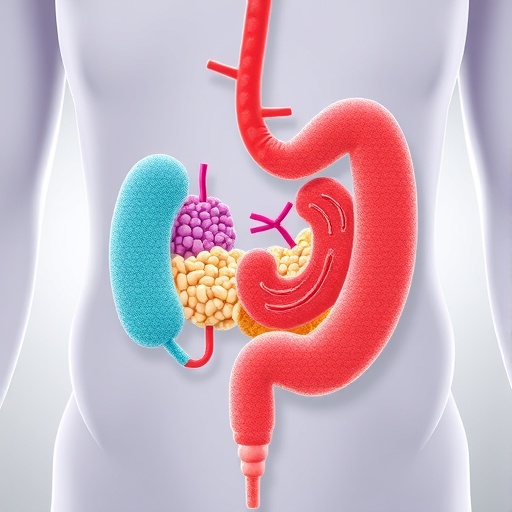In recent years, the intricate relationship between the human microbiome and various health conditions has garnered increasing attention in the field of medical research. Notably, the role of the gastric microbiome in the pathogenesis and progression of gastric cancer has emerged as a critical area of investigation. A groundbreaking study conducted by Shimogama and colleagues provides vital insights into the complex interplay between gastric microbiota and cancer risk, yielding potential implications for future therapeutic strategies. This research signals a paradigm shift in our understanding of gastric cancer, a malignancy that remains one of the leading causes of cancer-related mortality worldwide.
The gastric microbiome refers to the community of microorganisms residing within the gastric environment. This environment, traditionally considered a hostile milieu for bacteria due to its acidic pH, has recently been shown to harbor diverse microbial populations. The study by Shimogama et al. meticulously sequences and characterizes the gastric microbiome in patients diagnosed with gastric cancer, unveiling diverse microbial structures that correlate with cancer risk and prognosis. The research methodology employed by the authors provides a model for the rigorous exploration of microbiomic contributions to cancer development.
The researchers utilized state-of-the-art sequencing technologies to analyze gastric biopsy samples from patients with varying stages of gastric cancer. By comparing microbiota profiles from cancerous and non-cancerous tissues, the team was able to discern significant differences in microbial diversity and composition. Particularly, the study identified an overrepresentation of certain bacterial taxa in cancerous tissues, indicating that specific microbial signatures may serve as biomarkers for gastric cancer diagnosis and progression.
In their analysis, Shimogama et al. observed that the gastric microbiome in cancer patients exhibited reduced diversity compared to healthy controls. A decline in microbial richness is often associated with dysbiosis, a state of microbial imbalance that has been implicated in various disease processes. The findings from this work suggest that alterations in the gastric ecosystem could play a pivotal role in the onset and progression of gastric cancer, underscoring the need for further investigations into the mechanisms underlying these associations.
One of the remarkable aspects of this study is its potential to reshape therapeutic approaches to gastric cancer. Conventional treatment modalities, including surgery, chemotherapy, and targeted therapies, often face limitations due to the heterogeneity of cancer biology. However, understanding the microbial landscape of the gastric environment opens up avenues for novel interventions that could modulate the microbiome to improve patient outcomes. For instance, the introduction of probiotics or dietary modifications may serve as adjunctive therapies aimed at restoring microbial balance, thereby mitigating cancer progression.
The implications of the gastric microbiome extend beyond cancer risk; they may also encompass patient prognosis. The study’s findings indicate that specific microbial profiles correlate with clinical outcomes, including tumor staging and patient survival. By elucidating these relationships, clinicians could potentially harness microbiome profiling to predict disease progression more accurately and tailor treatment strategies accordingly. As such, microbiome analysis could become an invaluable tool in the precision medicine arsenal against gastric cancer.
The research conducted by Shimogama et al. has also sparked a larger conversation about the role of the microbiome in other malignancies. While this study specifically focuses on gastric cancer, parallels have been drawn with colorectal cancer and other gastrointestinal malignancies where dysbiosis has been linked to tumorigenesis. This highlights the potential for cross-disciplinary research aimed at uncovering microbiome-mediated pathways that contribute to cancer across different organ systems.
Furthermore, the findings may inspire a wave of subsequent research endeavors aimed at unraveling the complexities of the gastric microbiome. Given the global prevalence of gastric cancer, particularly in regions like East Asia, invest in understanding microbial influences could burgeon as a public health priority. Studies exploring the interaction between specific dietary components, microbial inhabitants, and cancer risk may offer additional layers of insight that could inform nutritional guidelines for populations at higher risk.
Amidst these advancements, it remains crucial to consider the challenges associated with microbiome research. The variability and specificity of microbial communities, influenced by numerous factors including diet, geography, and genetics, pose complexities in establishing causative relationships. Future studies must address these limitations, employing larger, more diverse cohorts to ensure the generalizability of findings.
In conclusion, the research spearheaded by Shimogama et al. illuminates the pivotal role of the gastric microbiome in gastric cancer, establishing a foundation for future inquiries aimed at unraveling its complexities. This transformative work not only enriches our understanding of the disease but also heralds the dawn of innovative microbial-targeted therapies that may one day revolutionize the treatment landscape for gastric cancer patients. As the field progresses, continued collaboration across disciplines will be essential in harnessing the microbiome’s potential in combating malignancies.
In summary, the study underscores the importance of further exploration into microbial involvement in cancer, paving the way for exciting developments in diagnostics and therapeutics that could ultimately enhance patient care and survival outcomes.
Subject of Research: Gastric microbiome and its association with gastric cancer risk and prognosis.
Article Title: Gastric microbiome in gastric cancer sequence depicts diverse microbial structures associated with cancer risk and prognosis.
Article References:
Shimogama, T., Tahara, T., Shijimaya, T. et al. Gastric microbiome in gastric cancer sequence depicts diverse microbial structures associated with cancer risk and prognosis.
J Transl Med 23, 1039 (2025). https://doi.org/10.1186/s12967-025-07046-5
Image Credits: AI Generated
DOI: 10.1186/s12967-025-07046-5
Keywords: Gastric microbiome, gastric cancer, dysbiosis, microbial diversity, cancer prognosis, treatment strategies.
Tags: breakthroughs in microbiome research and cancercancer-related mortality and gastric cancerfuture directions in cancer microbiome studiesgastric cancer pathogenesis and progressiongastric microbiome and cancer riskimplications of gastric microbiome for therapeutic strategiesmicrobial diversity in gastric cancer patientsmicrobiome sequencing technologies in cancer researchrelationship between microbiome and gastric cancerrole of gastric microbiota in cancer prognosisthe significance of gastric microbial populationsunderstanding gastric cancer through microbiomic analysis





